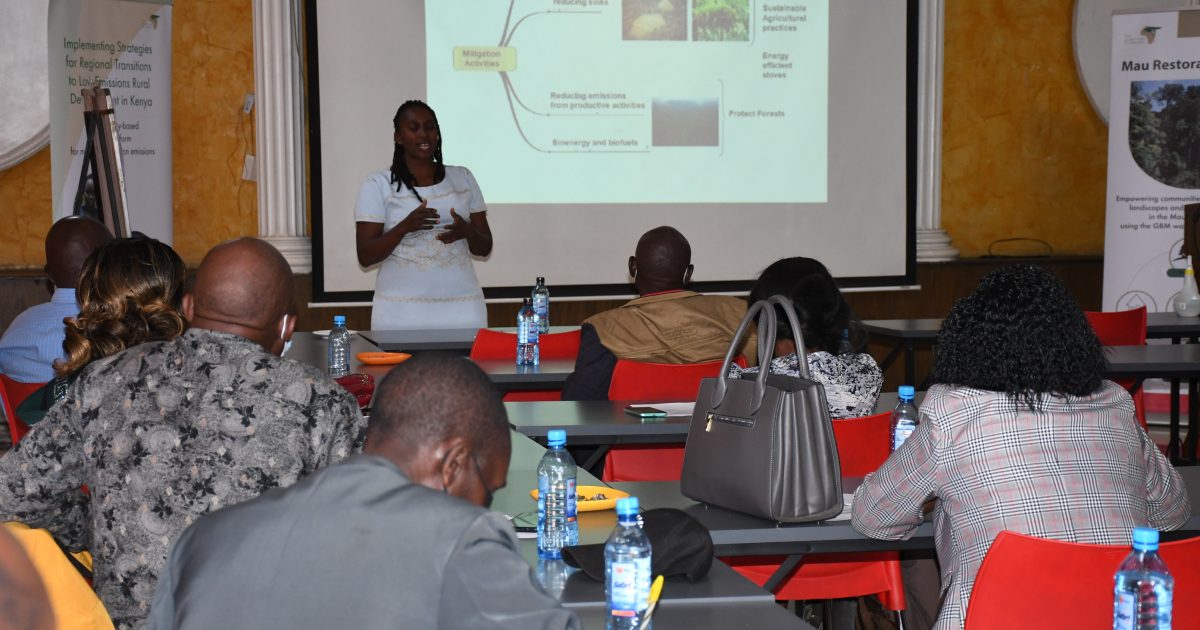As Kenya, like the rest of the world continues to experience warmer temperatures, rainfall variability and increased severe and frequent extreme weather changes, a public-private partnership initiative targeting 4,000 farmers in Nakuru has been activated to scale up adoption of Climate-Smart Agriculture (CSA) practices.
The beneficiaries, who are women and youthful farmers living within Mau Ecosystem are being trained on application of improved farm practices coupled with the planting of high yield and climate resilient seeds in the programme jointly rolled out by the Green Belt Movement, Kenya Forest Service (KFS) and the County Government.
Deputy Executive Director in Charge of Programmes at Greenbelt Movement, Ms Mercy Karunditu pointed out that the venture was part of efforts aimed at achieving the United Nations’ Sustainable Development Goal number 2 of ending hunger, achieving food security and improved nutrition, and promoting sustainable agriculture.
The programme also intends to increase technical know-how of farmers on Climate-Smart Agriculture approaches, unlock market driven value-chains for youth and women and improve their capacity to participate in productive land and water management and increase the women in agribusiness’ access to finance.
Speaking during the opening of a capacity building workshop on Climate-Smart Agriculture practices for farmer trainers, agricultural extension officers and agronomists Ms Karunditu pointed out that the most critical component of CSA which the targeted farmers were being encouraged to adopt is agroforestry which leads to improved productivity, less erosion and healthier ecosystems. It also restores soil health, which reduces the need for fertilizer while increasing incomes.
Agroforestry is a land-use management system in which trees or shrubs are grown around or among crops or pastureland.
It helps to improve soil fertility, soil structure, retain soil moisture, protect the crops and increase crop yields.
“Our current food production systems face an enormous challenge, made even more frightening by climate change. We must dramatically scale up CSA, an approach to food production that can improve productivity, increase resilience to climate change and reduce greenhouse gas emissions.
Agroforestry will also protect the crops from strong winds and pests. These beneficial roles of trees will help increase crop yields,” the Deputy Executive Director said.
She was flanked by County Director for Environment, Energy, Natural Resources and Climate Change, Ms Grace Karanja and County Director for Gender and Culture Ms Selina Nkatha.
Ms Karunditu said that farmers were being encouraged to involve integration and use of trees in crop fields, farms and across agricultural landscapes.
She added, “We are empowering them to grow on their farms trees and fruit crops such as mangoes, macadamia, oranges and avocados. In doing so, they are empowered economically by selling the fruits while pressure for firewood and timber is reduced on forests in water catchment areas.
Trees buffer climate change impacts and variability and diversify land use and farming systems, providing additional livelihood and environmental benefits not delivered through land management without trees.” She lamented.
Ms Karunditu observed that climate change had adversely impacted on the amount of various yields of crops due to increased exposure to high temperature, water stress, flooding, diseases, pests and salinity.
As a mitigation measure, the venture was promoting use of crop varieties that are early maturing and resilient to climate change.
According to the County Director for Environment, Energy, Natural Resources and Climate Change, farmers exercising agroforestry recorded an increase in dairy production, improved farm productivity, income diversification and environmental sustainability.
“Farmers can grow trees which are also folder crops such as calliandra that have high amounts of proteins required by cattle for the production of quality milk. Most of these fodder trees are resistant to drought and leguminous compared to nappier grass often used as it will require adequate irrigation,” she explained.
Ms Karanja stated that adoption of CSA was effective in enabling communities to adapt to the impacts of climate change, while sustainably increasing productivity, and delivering co-benefits of reducing/removing Greenhouse Gas emissions for environmental sustainability, nutrition and livelihoods.
She assured farmers that the county administration was committed to supporting institutional, policy, and investment environments, which can help Climate-Smart Agriculture innovations reach scale rapidly.
Ms Karanja observed that the farmers were also being equipped with skills to manufacture and use renewable, biodegradable, sustainable, and environmentally friendly organic fertilizers and pesticides on their enterprises.
“Organic fertilizer is usually made from plant or animal waste or powdered minerals. Examples include manure and compost. In addition to releasing nutrients as they break down organic fertilizers improve the structure of the soil and increase its ability to hold water and nutrients.
Since they are not synthetic organic fertilizers present little to no risk of toxic buildups of chemicals and salts that increase soil acidity which can be deadly to plants,” stated the Director
The programme is also promoting fish farming as an alternative source of nutrient-rich food and source of livelihood that can bolster household incomes and increase resilience in the face of shocks.
Ms Nkatha indicated that the project seeks to strengthen youth and women’s capacity to meaningfully engage in CSA.
“We recognize that food security starts and ends with women, who account for 60-75 per cent of the labour force in smallholder agriculture in Kenya, as well as in many other countries in Africa. It is therefore crucial to leave no one behind in the quest to attaining food and nutrition security for all,” noted the County Director for Gender and Culture.
Women, added Ms Nkatha, are disproportionately affected by overlapping challenges of poverty and food insecurity caused by floods, droughts, locusts and now Covid-19.
By Jane Ngugi and Dennis Rasto





